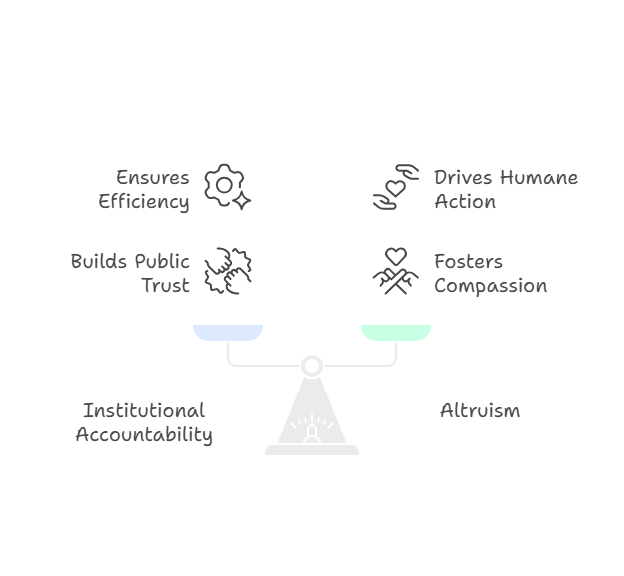- Filter By :
- Theoretical Questions
- Case Studies
-
Q. "In an era of institutional accountability and performance metrics, is there still space for altruism in public administration? Discuss. (150 words)
10 Jul, 2025 GS Paper 4 Theoretical QuestionsApproach:
- Introduce with a relevant quote and brief about Altruism
- Delve into why Altruism is Losing Significance Today and Why it is still Relevant
- Suggest balancing measure with an example
- Conclude suitably
Introduction:
"Public service must be more than doing a job efficiently and honestly. It must be a complete dedication to the people and to the nation." - Margaret Chase Smith
- In today’s public administration, institutional accountability and performance metrics have become indispensable tools to ensure transparency, efficiency, and service delivery.
- Yet, in this increasingly quantifiable ecosystem, altruism—the selfless concern for the welfare of others, remains significant though faces marginalization.
Body:
Why Altruism is Losing Significance Today:
- Overemphasis on Quantifiable Performance: Strict focus on numbers and targets leaves little room for unmeasurable values like compassion, empathy, or intent.
- E.g., sanitation drive outcomes are tracked via toilet construction, but not usage or behavioural change—where altruism plays a role.
- Fear of Overstepping Boundaries: Increased audit, RTI pressure, and media scrutiny make officers risk-averse, curbing altruistic spontaneity.
- “Why take an initiative that might backfire or invite disciplinary action?” is a rising sentiment.
- Bureaucratic Culture of Rule-Compliance: A culture that rewards procedural correctness often discourages emotionally driven or compassionate responses.
- Professional Burnout and Fatigue: Overburdened and under-recognized civil servants may lose intrinsic motivation, including altruistic impulses.
- Maslow’s hierarchy shows that altruism emerges only after basic psychological needs are met.
Why Altruism is Still Relevant in Public Administration
- Humanizing Governance: Metrics may guide delivery, but only altruism ensures empathy and dignity in interaction with citizens—especially the vulnerable.
- Example: During the COVID-19 crisis, public servants like IAS Rajendra Bhatt provided personal support to isolated elderly citizens—beyond their formal duties.
- Bridging Systemic Gaps: No system or metric can cover every eventuality. Altruistic civil servants act when the system falters.
- A district collector arranging last-mile delivery of medicines to remote areas despite no directive shows altruistic initiative.
- Enhancing Trust in Government: Citizens are more likely to trust and cooperate with the state when they perceive intent and care, not just procedural delivery.
- The Gandhian idea of “Sarvodaya” (welfare of all) emphasizes service without expectations.
- Moral Anchor in Ethical Dilemmas: When rules conflict or priorities clash, altruism serves as the moral compass for ethical decision-making.
- In ethics, this resonates with Kant’s duty-based ethics: do what is right, not what is rewarded.
- Altruism Fuels Innovation and Passion: Altruistically motivated officers go beyond minimum requirements, often leading to innovative governance.
- Mohd. Ali Shihab IAS, who grew up in an orphanage, works tirelessly in underdeveloped regions with deep empathy for the poor.
Altruism Coexisting with Performance Metrics:

- Altruism should not be sacrificed for efficiency. Public servants can integrate both by serving with empathy while working within performance frameworks.
- Performance metrics should include measures of ethical behavior, integrity, and public trust
- For instance, Dr. Verghese Kurien (White Revolution), balanced altruistic ideals with performance-driven targets to revolutionize India’s dairy industry.
Conclusion:
Accountability mechanisms and metrics are vital for ensuring efficient public service, but they must not become the ceiling of our expectations. Altruism adds the human touch that metrics can never capture. The two—accountability and altruism—need not be adversaries; they can be complementary forces in ethical governance.
To get PDF version, Please click on "Print PDF" button.
Print PDF




